
Katharine Houghton Hepburn was an American actress whose career as a Hollywood leading lady spanned six decades. She was known for her headstrong independence, spirited personality, and outspokenness, cultivating a screen persona that matched this public image, and regularly playing strong-willed, sophisticated women. She worked in a varied range of genres, from screwball comedy to literary drama, which earned her various accolades, including four Academy Awards for Best Actress—a record for any performer.

Spencer Bonaventure Tracy was an American actor. He was known for his natural performing style and versatility. One of the major stars of Hollywood's Golden Age, Tracy was the first actor to win two consecutive Academy Awards for Best Actor, from nine nominations. During his career, he appeared in 75 films and developed a reputation among his peers as one of the screen's greatest actors. In 1999, the American Film Institute ranked Tracy as the 9th greatest male star of Classic Hollywood Cinema.

The Barretts of Wimpole Street is a 1934 American romantic drama film directed by Sidney Franklin based on the 1930 play of the same title by Rudolf Besier. It depicts the real-life romance between poets Elizabeth Barrett and Robert Browning, despite the opposition of her abusive father Edward Moulton-Barrett. The film was nominated for the Academy Award for Best Picture and Shearer was nominated for the Academy Award for Best Actress. It was written by Ernest Vajda, Claudine West, and Donald Ogden Stewart, from the successful 1930 play The Barretts of Wimpole Street by Rudolf Besier, and starring Katharine Cornell.
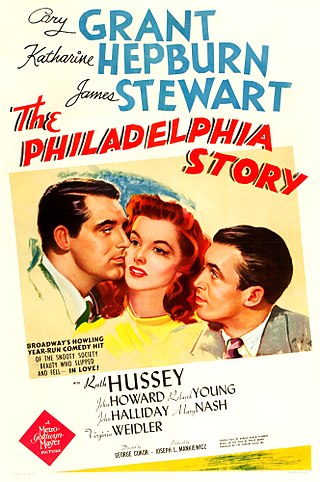
The Philadelphia Story is a 1940 American romantic comedy film starring Cary Grant, Katharine Hepburn, James Stewart and Ruth Hussey. Directed by George Cukor, the film is based on the 1939 Broadway play of the same name by Philip Barry about a socialite whose wedding plans are complicated by the simultaneous arrival of her ex-husband and a tabloid magazine journalist. The socialite, played by Hepburn in both productions, was inspired by Helen Hope Montgomery Scott (1904–1995), a Philadelphia heiress who had married Barry's friend.

Woman of the Year is a 1942 American romantic comedy-drama film directed by George Stevens and starring Spencer Tracy and Katharine Hepburn. The film was written by Ring Lardner Jr. and Michael Kanin, and produced by Joseph L. Mankiewicz.

Mary of Scotland is a 1936 American historical drama film starring Katharine Hepburn as the 16th-century ruler Mary, Queen of Scots. Directed by John Ford, it is an adaptation of the 1933 Maxwell Anderson play, with Fredric March reprising the role of Bothwell, which he also performed on stage during the run of play. The screenplay was written by Dudley Nichols. Ginger Rogers wanted to play this role and made a screen test, but RKO rejected her request to be cast in the part feeling that the role was not suitable to her image.

Little Women is a 1933 American pre-Code drama film directed by George Cukor, and starring Katharine Hepburn, Joan Bennett, Frances Dee, and Jean Parker. The screenplay, written by Sarah Y. Mason and Victor Heerman, is based on the 1868-1869 two-volume novel of the same name by Louisa May Alcott.

Pat and Mike is a 1952 American romantic comedy film starring Spencer Tracy and Katharine Hepburn. The movie was written by Ruth Gordon and Garson Kanin, and directed by George Cukor. Cukor directed The Philadelphia Story (1940) with Hepburn, and Cukor, Gordon and Kanin teamed with Hepburn and Tracy again for Adam's Rib (1949). Gordon and Kanin were nominated for the 1952 Academy Award for Best Original Screenplay for their work on Pat and Mike.
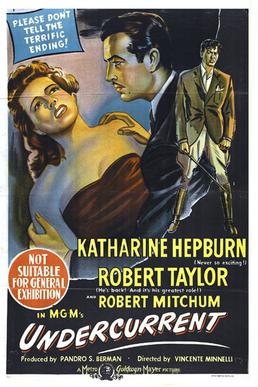
Undercurrent is a 1946 American film noir drama directed by Vincente Minnelli and starring Katharine Hepburn, Robert Taylor, and Robert Mitchum. The screenplay was written by Edward Chodorov, based on the story "You Were There'" by Thelma Strabel, and allegedly contained uncredited contributions from Marguerite Roberts.

Sara Haden was an American actress of the 1930s through the 1950s and in television into the mid-1960s. She may be best remembered for appearing as Aunt Milly Forrest in 14 of the 16 entries in the Metro-Goldwyn-Mayer Andy Hardy film series.
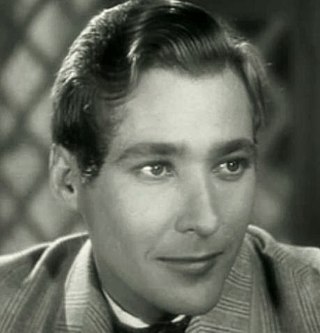
Robert Douglass Montgomery was an American film actor.
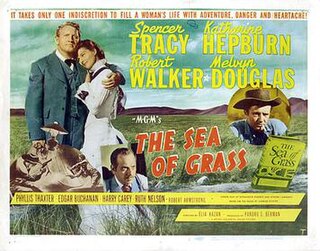
The Sea of Grass is a 1947 American Western film set in the American Southwest. It was directed by Elia Kazan and based on the 1936 novel of the same name by Conrad Richter. The film stars Katharine Hepburn, Spencer Tracy, and Melvyn Douglas.
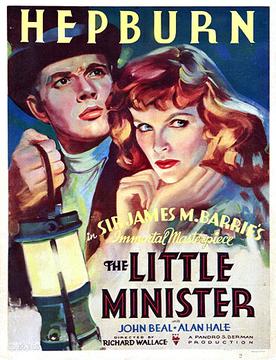
The Little Minister is a 1934 American historical drama film starring Katharine Hepburn and directed by Richard Wallace. The screenplay by Jane Murfin, Sarah Y. Mason, and Victor Heerman is based on the 1891 novel and subsequent 1897 play of the same title by J.M. Barrie. The picture was the fifth film adaptation of the works, following four silent film versions. The original novel was the third of the three "Thrums" novels, which first brought Barrie to fame.
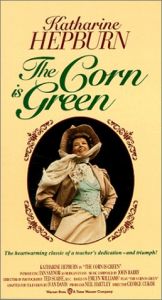
The Corn Is Green is a 1979 American made-for-television drama film starring Katharine Hepburn as a schoolteacher determined to bring education to a Welsh coal mining town, despite great opposition. It was directed by George Cukor, the tenth and last collaboration on film between the director and the actress, and is the second and last made-for-television film directed by Cukor. The filming was done in Wales. It was adapted from the 1938 play of the same name by Emlyn Williams, and had previously been filmed in 1945 with Bette Davis in the main role.
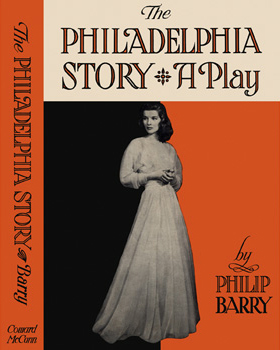
The Philadelphia Story is a 1939 American comic play by Philip Barry. It tells the story of a socialite whose wedding plans are complicated by the simultaneous arrival of her ex-husband and an attractive journalist. Written as a vehicle for Katharine Hepburn, its success marked a reversal of fortunes for the actress, who was one of the film stars deemed "box office poison" in 1938.

Katharine Martha Houghton Hepburn was an American feminist social reformer and a leader of the suffrage movement in the United States. Hepburn served as president of the Connecticut Woman Suffrage Association before joining the National Woman's Party. In 1923 Hepburn formed the Connecticut Branch of the American Birth Control League with two of her friends, Mrs. George Day and Mrs. M. Toscan Bennett. She was the mother and namesake of actress Katharine Hepburn and the grandmother and namesake of actress Katharine Houghton.
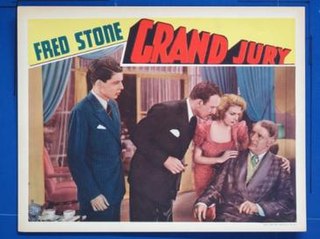
Grand Jury is a 1936 American crime drama film directed by Albert S. Rogell from a screenplay by Joseph A. Fields and Philip G. Epstein, based on a story by James Edward Grant and Thomas Lennon. Produced and distributed by RKO Radio Pictures, it premiered in New York City on July 31, 1936, and was released nationwide the following week on August 7. The film stars Fred Stone, Louise Latimer and Owen Davis, Jr.
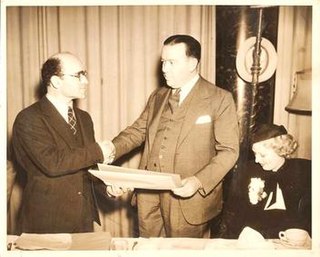
Cliff Reid, also known as George Clifford Reid, was an American film producer and film production studio founder during the 1930s and 1940s. In addition he also directed film shorts, and was the assistant director on several feature films.

Klondike Fury is a 1942 American drama film directed by William K. Howard, produced by the King Brothers, and released through Monogram. It stars Edmund Lowe.

Strange Wives is a 1934 American comedy film directed by Richard Thorpe, written by James Mulhauser, Barry Trivers, and Gladys Buchanan Unger, and starring Roger Pryor, June Clayworth, Esther Ralston, Hugh O'Connell, Ralph Forbes, and Cesar Romero. It was released on December 10, 1934, by Universal Pictures.




















